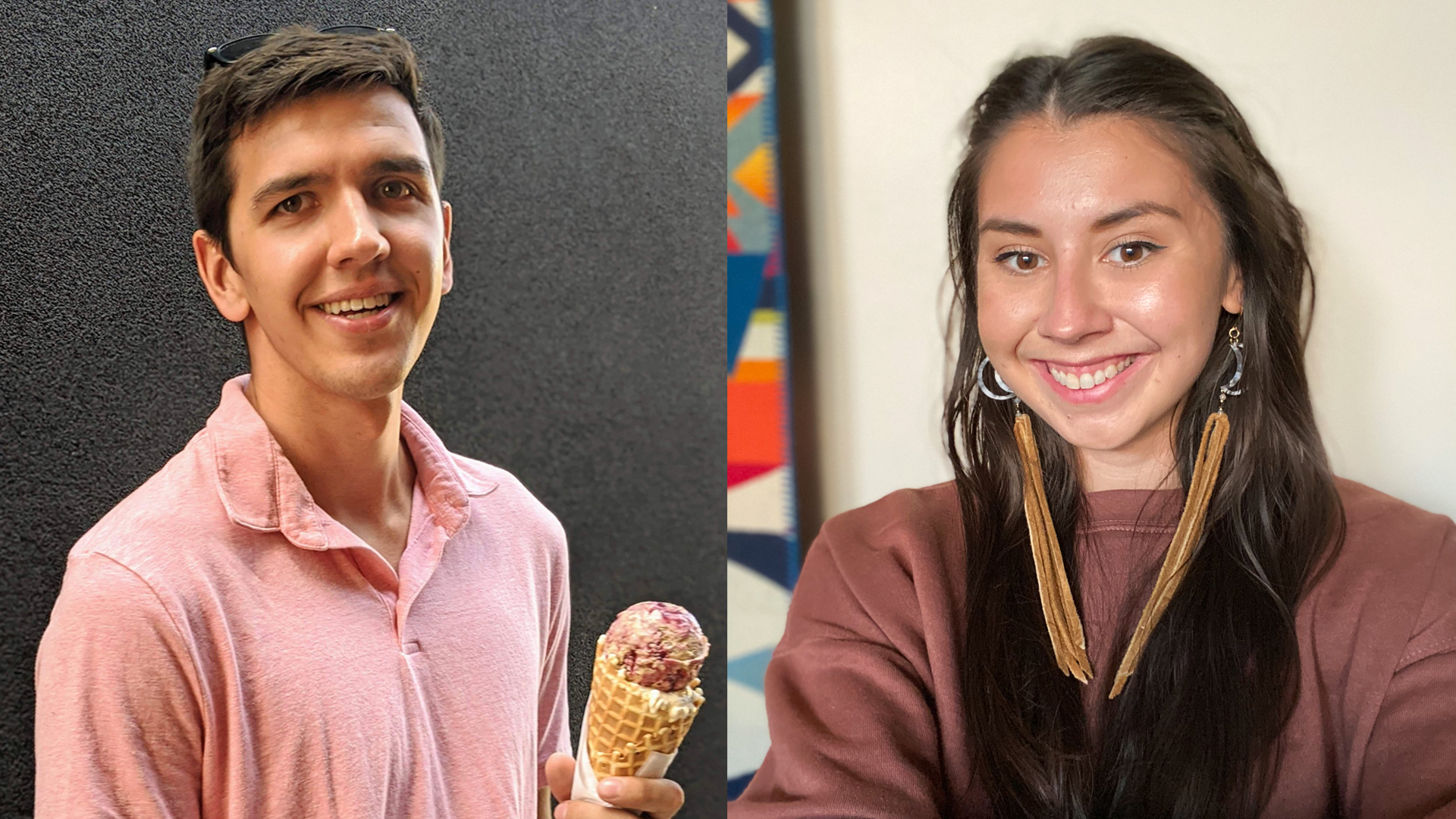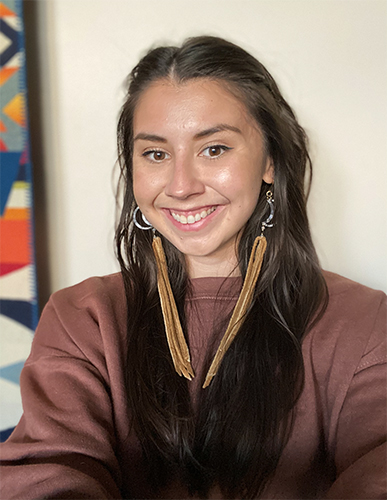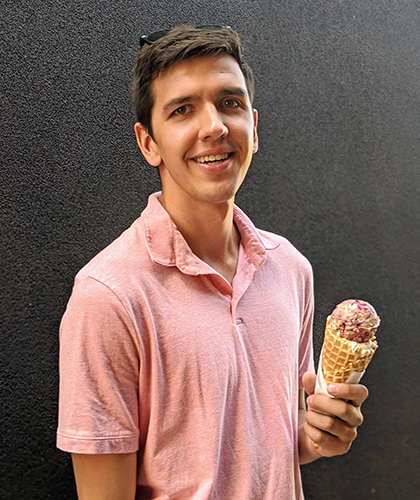Building the future of Indigenous health care
Laura Vega - 25 January 2021

Driven by a passion for the improvement of Indigenous health access and care in Canada, first-year students Hailea Purcell and Aldrin Hjelmeland began their journey last fall in the University of Alberta MD program. They are two of eight Indigenous learners who received full medical school entrance scholarships as part of a larger institutional initiative— the U of A was able to provide 36 scholarships for a total of $2.9 million with the support of Indspire, CIBC and other funding.
Purcell and Hjelmeland talk about the experiences that led them to medical school and their dreams of making a difference as physicians caring for Indigenous communities.
Hailea Purcell, MD Class of 2024

Purcell is Denesuline and a member of Smith's Landing First Nation in Treaty 8 territory. She grew up in Edmonton with her family, and started her career in health care as a nurse. “It was out of the blue. My oldest sister is a teacher, so that was something that I knew about, but I didn't really have any family members that were nurses or doctors, or health-care professionals,” says Purcell.
After completing her nursing program, Purcell went on to work at the Royal Alexandra Hospital, where she was able to work with inner-city populations. She also joined the Awasisak Indigenous Health Program at the Stollery Children’s Hospital.
“That was probably the most eye-opening experience for me in regards to really seeing Indigenous health-care professionals,” says Purcell. “Not only nurses, but I was able to actually work with Indigenous physicians and become open to the idea of First Nation people working as doctors, which I'd never seen before. I'd never even met an Indigenous health-care professional in my nursing degree.”
She felt encouraged to apply to medical school. Since she had a passion for Indigenous health, she reached out to the U of A Indigenous Health Initiatives Program (IHIP). She learned about Indspire’s gift and funding opportunities through IHIP and the U of A’s First Peoples’ House, both key supports for her as she began her MD program. The COVID-19 pandemic has made it challenging to create a tight community because of remote learning, but Purcell is at least glad she can fully focus on her studies thanks to Indspire’s scholarship. Without that help, she would have had to continue working as a nurse to put herself through medical school.
While she sees herself becoming a family physician or a pediatrician and working in smaller remote communities in the future, Purcell also wants to work closely with Indigenous youth during her program, when in-person interaction is possible again. In the meantime, she’s enjoying the opportunities she finds through IHIP to meet elders and interact with and learn from other First Nation physicians such as Nicole Cardinal, '12 MD, Indigenous clinician lead for education. Purcell looks forward to seeing these programs expand, hoping they create more spaces for Indigenous leaders in health and improve access to care.
“The most pressing issue to me is racism. We live in this diverse landscape of cultures, but we see a loss of Indigenous patients coming through health-care facilities, due to a variety of issues like poverty and intergenerational trauma. Just people not understanding where they have come from makes it very challenging for First Nation people to access health-care services and feel safe doing so,” says Purcell.
“I think it's going to be very different with the generation that I live in right now—they're interested in taking the time out of their day and of their lives to learn a bit more. Hopefully in the next 10 years it will be different for Indigenous peoples to access health care.”
Aldrin Hjelmeland, MD Class of 2024

Hjelmeland is Dehcho Dene and a member of Liidlii Kue First Nation. Originally from Yellowknife, he moved to Alberta years ago and attended the U of A for his undergraduate degree. He soon felt the calling to pursue a career in health care.
“Having that northern perspective, being an alternate guardian and trustee for my brother and having to advocate for him as he journeys through the medical service, really inspired me to pursue this path and lit the fire for me to bring back my services to the North,” says Hjelmeland. “There’s a lot of reliance on the South and I understand that, but having a person that's relatable to a lot of people up there is important. Throughout my experience in health care, I didn't have a physician or someone that really related to me, so it was very distant to me in that regard.”
Since he didn’t have any relatives working in the health-care field, the experience of applying to medical school and finding the resources he needed felt daunting. Hjelmeland applied through the Indigenous Health Initiatives Program, and says IHIP has been a strong support whenever he’s felt lost throughout the process. He learned about Indspire’s scholarships from IHIP.
“I'm grateful for this award, for how it removes barriers and allows me to really focus on the mission—which is learning as much as possible and absorbing as much as I can in medical school—to hopefully bring that back to the community and strive to meet their needs,” explains Hjelmeland.
For Hjelmeland, embarking on medical school during the COVID-19 pandemic has required some adjustment, but has been exciting nonetheless. “It's an incredible experience, with so many doors that are open now and so many new opportunities, great speakers, great professors. They're always willing to share their insights into the medical field. Of course, this is all new to me, and every day there is something new that I'm learning.”
Hjelmeland is exploring his options for a future specialty, although he has some interest in emergency medicine or family medicine as areas of care where he can support northern communities. He learns about new fields and possibilities every day and wants to welcome them with open arms. As he advances through the MD program, he wants to find ways to increase Indigenous representation and knowledge in medical schools.
“The representation of Indigenous content, mentors and physicians should be more than just checking off a box, but actually a meaningful experience learning from and with the community. Advocating for them and with them until the community really is at a solid place. It’s something I seek, and it’s a work in progress.”